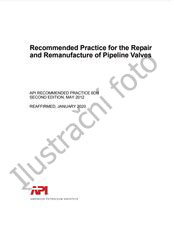Potřebujeme váš souhlas k využití jednotlivých dat, aby se vám mimo jiné mohly ukazovat informace týkající se vašich zájmů. Souhlas udělíte kliknutím na tlačítko „OK“.

API PUBL 4625-ed.1995
Service Station Personnel Exposures to Oxygenated Fuel Components - 1994
Přeložit název
NORMA vydána dne 1.8.1995
Informace o normě:
Označení normy: API PUBL 4625-ed.1995
Datum vydání normy: 1.8.1995
Kód zboží: NS-1139794
Počet stran: 163
Přibližná hmotnost: 520 g (1.15 liber)
Země: Americká technická norma
Kategorie: Technické normy API
Anotace textu normy API PUBL 4625-ed.1995 :
API PUBL 4625, 1995 Edition, August 1995 - Service Station Personnel Exposures to Oxygenated Fuel Components - 1994
SCOPE OF STUDY AND RESULTS
INTRODUCTION
The Clean Air Act Amendments (CAAA) of 1990 mandated the addition of 2.7% oxygen from oxygenated organic species (oxygenates) to automotive fuels during the winter season in areas not attaining the National Ambient Air Quality Standards for carbon monoxide (CO). Oxygenates are added to gasoline to increase the octane rating and minimize incomplete combustion, reducing air pollutants including carbon monoxide and unburned hydrocarbons. Anecdotal reports of health complaints (e.g., headaches, irritation, nausea) allegedly associated with oxyfuel use led to a variety of research efforts in 1993 (EPA, 1995). These included measurements of customer fuel oxygenate additive exposure during commuting (Lioy et al., 1994) and refueling (IT, 1995a). A survey of oil company occupational exposure records (IT., 1995b) provided adequate numbers of exposure measurements for employees in most sectors of the petroleum refining and marketing industry. However, relatively few measurements were available to document the exposure of attendants refueling cars (Hartle, 1993) or auto mechanics repairing vehicles in service stations. This study measured service station refueling attendant and mechanic exposures to oxygenated species [methyl tertiary butyl ether (MTBE), tertiary amyl methyl ether (TAME), ethyl tertiary butyl ether (ETBE), tertiary butyl alcohol (TBA), ethanol (ETOH), selected aromatics (benzene-B, toluene-T, xylenes-X, ethylbenzene-EB) and total hydrocarbons (THC)] during normal activities at service stations dispensing oxyfuels during the winter season and non-oxyfuels during the summer of 1994. Characterizations of dispensed liquid fuel compositions and local meteorology during sampling were also undertaken.



 Cookies
Cookies
